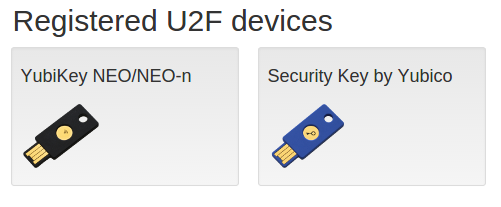Attestation and metadata
Attestation certificates
In both a U2F and WebAuthn registration, an Authentication device gives the server its attestation certificate. This certificate can be (optionally) used to verify the authenticity of the device. For example, a banking site might wish users to be able to provide their own U2F or WebAuthn devices for two-factor authentication, but only wishes to allow devices of certain approved vendors. For other sites it might be more about being able to provide some useful device information to the user, when listing his or her registered devices.
It’s up to each U2F/WebAuthn device vendor to decide what type of information goes into the attestation certificates, and how the authenticity of a certificate is validated. In Yubico’s case, all our attestation certificates are signed by our root CA. The same attestation certificate is used for both U2F and WebAuthn.
|
Note
|
If you have a YubiKey Preview device, the attestation certificate will instead be signed by our 2023Yubico FIDO Preview CA or Yubico FIDO Preview CA (prior to 2023). |
Yubico’s metadata format
|
Note
|
This is not part of the U2F standard. |
The attestation certificates are often small, and do not contain much information about the device model itself. For this reason Yubico has specified a metadata format which allows mapping attestation certificates to additional information about the device model and vendor, providing product images, etc. Yubico provides such metadata about our devices here. Several of our U2F server libraries are capable of reading this format. The same attestation certificate is used for both U2F and WebAuthn.
